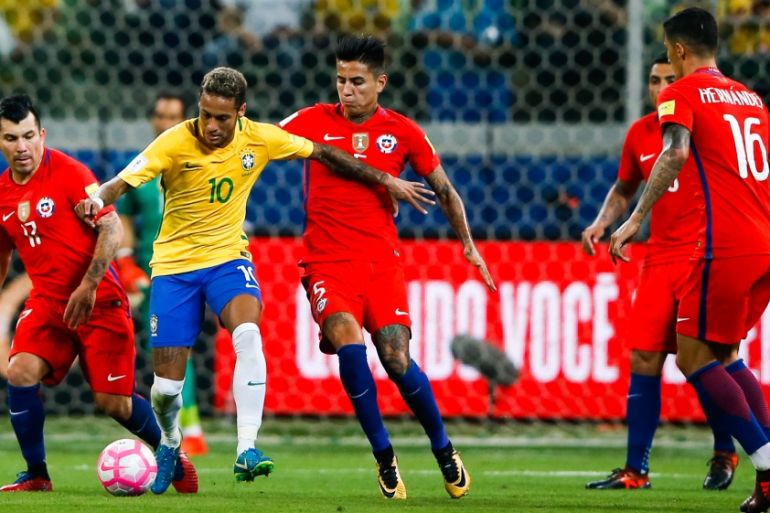FIFA urged to step up fight against homophobia
Rights groups and football experts call for stronger measures against anti-gay discrimination during matches.

As a black former professional footballer, Paul Mortimer is all too familiar with discrimination on a football field.
In the late 80s, the English midfielder was at the receiving end of racist abuse from both his teammates and opposing players and had objects thrown at him by fans during matches.
Keep reading
list of 4 itemsVatican denounces gender-affirming surgery, gender theory and surrogacy
Fears of discrimination in Thailand despite looming same sex marriage bill
Uganda’s Constitutional Court rejects petition against anti-gay law
Without the support of his club, Mortimer said he witnessed all kinds of discrimination up close from his teenage years.
“As a black guy, I had experienced a lot of discrimination, mostly racism, but I had also, throughout my career, witnessed a lot of other aspects of discrimination – sexism, homophobia, Islamophobia, visibility discrimination. All of these things I experienced,” the former Charlton and Aston Villa player told Al Jazeera.
In the heat of high-pressure games, hooliganism by fans and derogatory remarks hurled at the opposing players are far too common in international football.
Argentine fans chanted anti-gay slurs at the visiting Peruvian team in a tense goalless draw of a qualifying match in the capital Buenos Aires last month.
FIFA, football’s world governing body, handed the Argentine Football Association a $40,000 fine on Tuesday.
The monetary penalty was among a series that FIFA imposed on some Latin American nations, including Brazil, Peru, Chile and Mexico for homophobic chanting by fans during qualifying games of the 2018 World Cup, due to take place in Russia.
“Over the past two years, we strengthened and expanded our work to fight discrimination and promote diversity in football,” Federico Addiechi, FIFA’s Head of Sustainability & Diversity, has said.
“As a result, we have seen many positive responses and efforts from our member associations to tackle issues such as racism and homophobia in football and inside stadiums.”
Al Jazeera’s sports correspondent Lee Wellings said all forms of discrimination are rife in football, but it is homophobia that often gets pushed to the side because of the lack of openly gay players.
“There is no advanced plan to eradicate homophobia from sport,” he said. “I find it’s often tagged in to the end of drives against racism and sexism.”
‘Zero tolerance’
Despite FIFA’s efforts, rights groups and football experts have criticised the lack of effective action taken by football’s governing body and national associations to curb derogatory anti-gay conduct.
In an attempt to clamp down on discrimination and promote diversity, FIFA introduced a new anti-discrimination monitoring system for the 2018 World Cup qualifiers.
|
|
The body in, collaboration with the group Fare network, deployed match observers to monitor potentially “high-risk” games.
FIFA’s disciplinary code makes no mention of sexual discrimination, but players are suspended for at least five matches for offending “the dignity of a person or group of persons through contemptuous, discriminatory or denigratory words or actions concerning race, colour, language, religion or origin”.
Article 67 of the code also imposes liability for improper spectator conduct, which usually pertains to fines or warnings for the national federation.
“Football’s governing bodies have a bad reputation for dealing with the game’s problems, as proven by paltry racism fines,” said Wellings.
Mortimer, who is the professional players’ engagement manager at anti-discriminatory group Kick It Out, believes that FIFA needs to adopt “a zero tolerance policy”, move past fines and enforce stronger sanctions on teams and fans.
“If an incident happens, then as far as I’m concerned, that part of the stadium should get shut down, teams should be suspended from tournaments and things like that, because of the behaviour of their fans,” he said.
“Forget fining people because no amount of money is going to be enough.”
Fear of ‘coming out’
After years of legislative wrangling, Chile’s congress approved same-sex civil unions in 2015. A gay marriage bill was sent to congress by Chilean President Michelle Bachelet in August.
While, some South American countries, like Argentina and Brazil, have legalised same-sex marriage, the topic of LGBT rights is a controversial one across the continent.
Homophobic chanting is believed to be the result of both cultural insecurities and fanaticism at games.
Football experts say it is the machoism and the bravado culture of the sport that engenders homophobic rhetoric among fans at games.
“Characterising the opponent as ‘fag’ is a usual practice in the field of sport, used as an insult associated with weakness, or lack of skills to perform certain discipline,” Juan Pablo Morino, sport secretary of the Argentinian LGBT Federation, told Al Jazeera in an email.
There are approximately 4,000 professional footballers in the UK but reportedly none are openly gay.
Retired Los Angeles Galaxy defender and ex-Leeds player Robbie Rogers became the first openly gay male athlete in professional US sport in 2013.
Active footballers are reluctant to come out during their playing careers because of the stigma attached and for fear of being targeted in the locker room.
“In football, it is unthinkable to consider the option of coming out because this decision supposes, in addition to insults and violence from the opposing fans, a loss of economic benefits for the football player and perhaps a contempt of his own teammates,” said Morino.
Follow Saba Aziz on Twitter: @saba_aziz